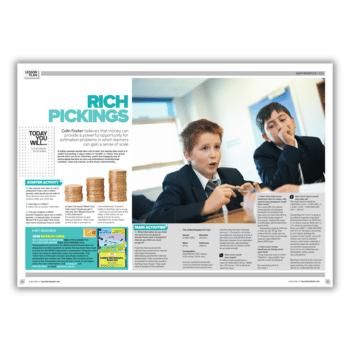Money can provide a powerful opportunity for KS3 estimation problems in which learners gain a sense of scale…
A million pounds sounds like a lot of cash, but exactly how much is it really? Converting a vague notion of ‘wealth’ or ‘riches’ into actual pound coins can be an extremely useful and engaging way of encouraging learners to carry out estimations involving large numbers, mass and volume.
Estimation KS3 learning objectives
- Do some estimating with large numbers
Starter activity
Has anyone ever seen or met a millionaire? If you had a million pounds, what would you do with it? Once learners have got into the context a little, you could ask ‘How big is a million?’ (A million has six zeroes: 1 000 000.)
Can you imagine a million pounds? Suppose I gave you a million pounds in pound coins. Would it fit in your bag? How many trips home would you have to make to take it all away?
What if you had a lorry? Could you get it into one van? Would it even fit in this classroom?
Encourage learners to give their gut reactions. They could do this orally or perhaps on mini whiteboards. It doesn’t matter if what they say is wrong – don’t try to correct them at this stage.
In this lesson we are going to try to do some calculations to answer these sorts of questions.
Colin Foster is a Reader in Mathematics Education at the Mathematics Education Centre at Loughborough University. He has written many books and articles for mathematics teachers. Follow him on X at @colinfoster77. Browse more KS3 maths games and lesson ideas.














